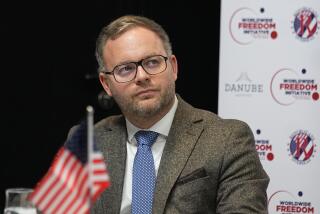Hungarian Liberal Rejects East Bloc Criticism
BUDAPEST, Hungary â The nation of Hungary will not be deflected from its liberal course in foreign affairs by objections from its hard-line socialist neighbors, one of the leading architects of Hungarian foreign policy said Friday.
Laszlo Kovacs, a secretary of state and deputy to Foreign Minister Gyula Horn, also confirmed that Hungary has no intention of closing off its Western borders to thousands of East German citizens who may want to emigrate to West Germany âuntil the present situation is resolved.â
Nearly 14,000 East Germans have crossed from Hungary into Austria on the way to West Germany since the Hungarians opened border crossings to them at midnight Sunday, despite the strenuous objections of the East German government, which accused the Hungarians of âtrafficking in human beings.â
Hungaryâs Interior Ministry estimates that about 60,000 East Germans are now traveling in Hungary. But officials are still uncertain about how many more may be intending to leave their homeland permanently and take up West Germanyâs standing offer of citizenship.
The Hungarian decision, which was foreshadowed by its step in May âto tear down the Iron Curtain,â as Kovacs said in an interview Friday, brought predictable disapproval from neighboring Romania and Czechoslovakia as well as East Germany.
The Romanians, who have been at odds with the Hungarians over the treatment of 2 million ethnic Hungarians in Romania, focused the brunt of their criticism on West Germany but described Hungaryâs decision as âincomprehensible.â
The Czechoslovaks, already angered at the Hungarian withdrawal from a joint project to build a hydroelectric dam on the Danube River, spoke cuttingly of âHungaryâs tendency these days to abrogate its international agreements.â
East Germany, Czechoslovakia and Romania represent the East Blocâs most reform-resistant states and, as the Hungarian news agency suggested, might amount to a âtriangle of oppositionâ against Hungary.
But Kovacs said the Hungarian Foreign Ministry sees its problems with the three countries as a series of âconflicting interests,â not as a unified front against Hungarian policy. However, he added, Hungary will continue to follow policies it sees as being in its national interests.
âWe cannot stop our reform process,â Kovacs said. âWe will not abandon our program just because it is not liked by our allies. We will go on with our economic and market reforms and with the political reforms that reflect the pluralistic nature of our society.
âWe donât want to try to âeducateâ any of our neighbors, but at the same time, we donât want them trying to educate us.â
Kovacs noted that in each of its âconflicts of interestâ with its neighbors, Hungary has taken steps to negotiate.
âWhat are we to do?â he asked. âWe are not interested in peaceful and harmonious relations that sacrifice our national interests and conflict with our goals.
âWe are neighbors with Czechoslovakia, with Romania, and we are close to the (East) German Democratic Republic. We all live together in Central Europe, and we have to find the means to live together in harmony.â
Kovacs said the Foreign Ministry could see the problem with the East Germans building in late June and early July when 160 East Germans took refuge inside the West German Embassy compound and refused to leave. When the West Germans closed the embassy, hundreds more camped outside and filled the surrounding streets, their cars packed with belongings.
Kovacs said the East German ambassador was called to the Foreign Ministry in Budapest and asked to formulate a solution.
However, he said, âthe best they could come up withâ was a promise that the would-be refugees would not be punished if they decided to return home. The East Germans rejected a Hungarian proposal that those who returned be given âfavorable considerationâ if they asked for permission to emigrate to the West.
âThe numbers were growing,â Kovacs said, âand we had the feeling that the problem would intensify when others who were vacationing in Romania and Bulgaria passed through Hungary on their way home.â
On Aug. 31, Foreign Minister Horn traveled to Berlin and told the East Germans that if they did not come up with a ârealisticâ solution, Hungary would have no other choice but to let the East Germans go to the West.
âWe didnât receive any answer,â Kovacs said.
On Sept. 8, he said, he called in the East German ambassador and informed him that the border would be opened after midnight Sept. 10. That action temporarily suspended a 1969 treaty agreement that obligated each nation to send back the otherâs citizens if they were caught trying to escape, or to prevent their departure to any third country for which they did not have valid travel papers.
âPractically,â Kovacs said, âthere was no way to do this, except by force. By this time, there were 10,000 of them (refugees), and this option was simply not feasible. Moreover, it was diametrically opposed to Hungaryâs own policy on freedom of travel and human rights. That motivated the decision, which was simply to let them go.â
Kovacs said he suggested to the East German ambassador that the problem was really East Germanyâs to solve and that Hungary had been caught in the middle.
âI told him that there are 200,000 ethnic Germans living in Hungary,â Kovacs said. âAny of them could have gone to West Germany and become citizens any time they wanted. I pointed out to him that not a single one had decided to leave Hungary.â
More to Read
Sign up for Essential California
The most important California stories and recommendations in your inbox every morning.
You may occasionally receive promotional content from the Los Angeles Times.










